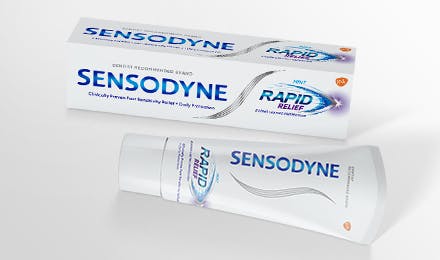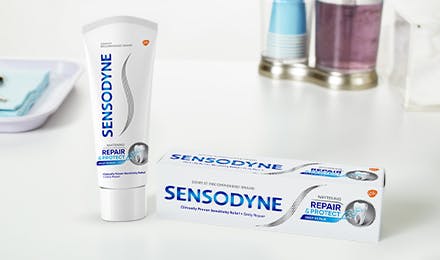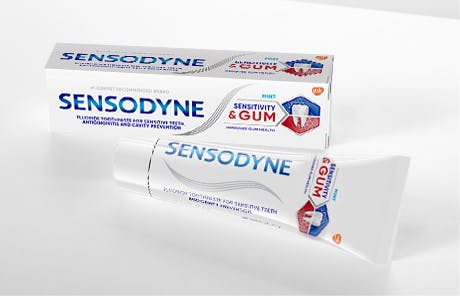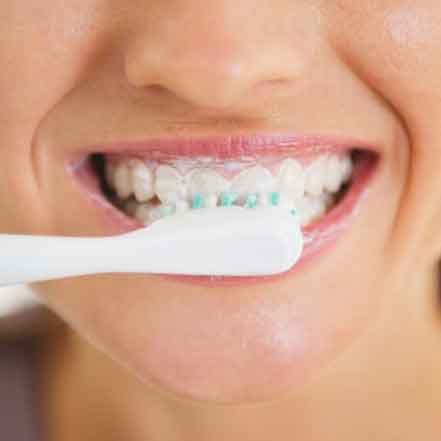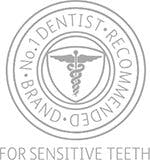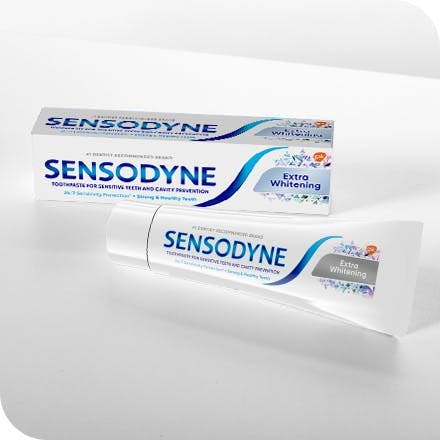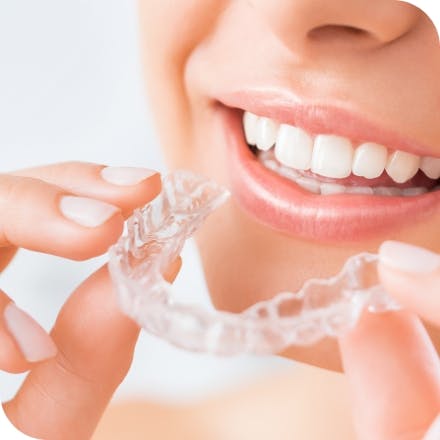Does Hydrogen Peroxide Whiten Teeth Safely?

Thinking about whitening your teeth? If you have sensitive teeth, it’s important to choose the right ingredients to get the job done. While there are a lot of over-the-counter (OTC) and do-it-yourself (DIY) whitening products, not all whitening ingredients are created equal. Hydrogen peroxide is found in numerous teeth whitening products, but it can cause unwanted side effects like tooth sensitivity.1 Learn if hydrogen peroxide is the best choice for you and explore alternative whitening treatments for sensitive teeth.
What Is Hydrogen Peroxide?
Hydrogen peroxide (H2O2) is a colorless liquid with a strong smell that’s available at most drugstores and pharmacies. It’s a staple in many homes, so you may already have some in your cabinet. Not only does hydrogen peroxide have medicinal applications, but it can also be used as a bleaching agent on clothes, teeth and hair.2
Hydrogen Peroxide in Whitening Products
Due to its ability to permeate enamel—the tooth’s hard outer layer—hydrogen peroxide is frequently used as a whitening solution. Many teeth whitening products such as trays, gels, strips, rinses and leave-on treatments often contain varying percentages of hydrogen peroxide to help bleach and lighten teeth.3
How Does Hydrogen Peroxide Whiten Teeth?
Hydrogen peroxide is a strong oxidizing agent that can permeate through the tooth’s enamel to the pulp, or the innermost portion of the tooth. The oxygen molecules from the hydrogen peroxide react with the colored compounds in your enamel to lighten them. This process can be influenced by environmental factors such as light, temperature and your mouth’s pH.3
Is It Safe to Use Hydrogen Peroxide to Whiten Sensitive Teeth?
While hydrogen peroxide makes an effective whitening agent, individuals with sensitive teeth need to exercise caution before using hydrogen peroxide products. This is because hydrogen-peroxide-based whitening treatments may cause sensitive teeth.
One of the main causes of sensitive teeth is worn tooth enamel. The protective surface enamel of your tooth wears down through a process called demineralization. Essentially, our teeth are always remineralizing (gaining minerals back) and demineralizing (losing minerals). Good oral hygiene helps re-mineralize your teeth after the demineralization process. This process is completely normal, however; when the demineralization process overtakes the remineralization process, the tooth’s enamel begins to wear down, making the tooth more prone to sensitivity.5
If you use hydrogen peroxide products when the inner layers of your teeth are exposed, the potential for sensitivity-related side effects increases. If you experience sensitivity while whitening your teeth with hydrogen peroxide products, talk to your dentist for advice. Overall, individuals with sensitive teeth or worn tooth enamel may want to seek out gentler teeth whitening solutions that contain fewer abrasive ingredients.5
Whitening Solutions for Sensitive Teeth
If you have sensitive teeth, consult your dentist to find the best whitening solution for you. For individuals who want to whiten their sensitive teeth, a two-in-one toothpaste that helps protect against sensitivity and provides gentle whitening benefits is a popular option.6 A desensitizing toothpaste can help reduce the sensations of pain within the tooth, while a remineralizing toothpaste can help rebuild your enamel and combat tooth sensitivity.
Sensodyne Clinical White is gentle on teeth and doesn’t contain hydrogen peroxide that may trigger your sensitivity. With twice daily brushing, enjoy whiter, brighter teeth and sensitivity protection from Sensodyne.
Source Citations:
- Comparison between the effect of commercially available chemical teeth whitening paste and teeth whitening paste containing ingredients of herbal origin on human enamel. AYU Journal. https://www.ncbi.nlm.nih.gov/pmc/articles/PMC6369603/. Accessed 12/20/22.
- Hydrogen Peroxide. H2O2. PubChem. https://pubchem.ncbi.nlm.nih.gov/compound/Hydrogen-peroxide. Accessed 12/20/22.
- Whitening. American Dental Association. https://www.ada.org/resources/research/science-and-research-institute/oral-health-topics/whitening. Accessed 12/20/22.
- In vitro FT-IR study of the effects of hydrogen peroxide on superficial tooth enamel. Journal of Dentistry. https://www.sciencedirect.com/science/article/abs/pii/S0300571206001989. Accessed 12/20/22.
- The Perils of Sensitive Teeth | University of Utah Health. https://healthcare.utah.edu/healthfeed/postings/2017/12/senstive-teeth.php. Accessed 12/20/22.
- Sensitive Teeth - Heat and Cold Sensitivity. MouthHealthy. Oral Health Information from the ADA. https://www.mouthhealthy.org/all-topics-a-z/sensitive-teeth/. Accessed 12/20/22.


